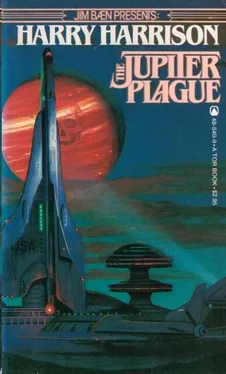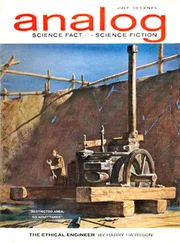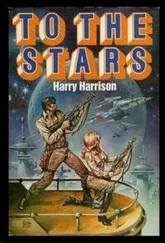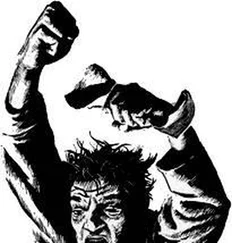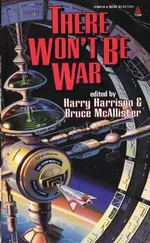Гарри Гаррисон - The Jupiter Plague
Здесь есть возможность читать онлайн «Гарри Гаррисон - The Jupiter Plague» весь текст электронной книги совершенно бесплатно (целиком полную версию без сокращений). В некоторых случаях можно слушать аудио, скачать через торрент в формате fb2 и присутствует краткое содержание. Год выпуска: 1987, ISBN: 1987, Издательство: Tor, Жанр: Фантастика и фэнтези, на английском языке. Описание произведения, (предисловие) а так же отзывы посетителей доступны на портале библиотеки ЛибКат.
- Название:The Jupiter Plague
- Автор:
- Издательство:Tor
- Жанр:
- Год:1987
- ISBN:0-812-53975-3
- Рейтинг книги:5 / 5. Голосов: 1
-
Избранное:Добавить в избранное
- Отзывы:
-
Ваша оценка:
- 100
- 1
- 2
- 3
- 4
- 5
The Jupiter Plague: краткое содержание, описание и аннотация
Предлагаем к чтению аннотацию, описание, краткое содержание или предисловие (зависит от того, что написал сам автор книги «The Jupiter Plague»). Если вы не нашли необходимую информацию о книге — напишите в комментариях, мы постараемся отыскать её.
The Jupiter Plague — читать онлайн бесплатно полную книгу (весь текст) целиком
Ниже представлен текст книги, разбитый по страницам. Система сохранения места последней прочитанной страницы, позволяет с удобством читать онлайн бесплатно книгу «The Jupiter Plague», без необходимости каждый раз заново искать на чём Вы остановились. Поставьте закладку, и сможете в любой момент перейти на страницу, на которой закончили чтение.
Интервал:
Закладка:
“I know, sir,” Rand said. He tapped the sheets. “But this is a good orbit. I’ve checked it eight ways from Sunday and so has everyone else. It will get us down.”
“No doubts?”
“No, sir.”
“All right. Feed it in and prepare to implement during the next window. I’ll let the crew know.”
Four hours later the computer actuated the braking jets and the long fall to the landing site began. Down through the hurtling torrents of the atmosphere the bulky form of the “Pericles” dropped, pitting its mass and the thrust of its thundering jets against the gravitational pull of Jupiter and the attacking weight of the dense atmosphere. Screaming winds buffeted it, tried to turn it from its plotted course, but sensitive instruments detected the deviation even as it began and informed the computer: the incandescent finger of an atomic jet flared, then another, making the constant compensations and balances that kept the ship’s fall under control. Lightning crackled through the soup-thick atmosphere that was compressed by a gravity almost three times greater than Earth’s, while methane and ammonia rain hammered at the rocket’s metallic skin.
No echo of the tempest outside penetrated to the control room, where the ordered calm was disturbed only by the distant hum of the air vent and an occasional rustle as one of the three men in the deep chairs changed position and spoke a few words in a low voice. The thick and insulated walls cut off all sound and sight, the few tiny direct-vision ports were sealed and capped, and only one viewscreen held a televised view of the surging atmosphere outside, a dark and roiling cloud mass of no interest. The display on the other screens was far more relevant, the course plot, altitude, speed, radar soundings. The ship fell.
“On course so far without readable deviation,” the second officer, Commander Rand, said. “We’re going to sit down right in the middle of that iceberg.” He was a blond man with a mild expression, and seemed too young for the naval rank of commander, even though it was a technical rank earned by his prowess in the mysteries of computer control. He had programmed this landing precisely and completely, so that now all he had to do was sit back and watch it happen.
“I wish you would not refer to the Reef as an iceberg,” First Officer Weeke said with slow Dutch thoroughness. “It is made of ice not as we know it on Earth but instead compacted to an incredible hardness. The radio probes have shown that and we have all the readings to prove this is a solid object on which we can land with impunity—”
“Wind velocity is below a hundred m.p.h. What’s the air temperature?” Captain Bramley asked.
“Minus one hundred fifty degrees,” Rand said. “Just a few degrees lower than the Reef temperature. We’re almost down.”
They watched the indicators in silence, alert for the emergency that never came, and in each sweep of their eyes across the crowded boards they rested longest on the trajectory display screen where the red blob of their position was sliding down the white line of the selected course toward the rising bulk of the Reef.
Now they were landing on it. Rocket exhausts lanced down slowing the ponderous “Pericles” almost to a stop, jamming the men deep into their acceleration couches, as radar waves probed the surface below looking for the optimum spot for a landing. Then lateral rockets fired, easing them over as they dropped so that they could come to rest on the flattest surface. Hotter and faster burned the jets digging into the ice and sending out clouds of steam that instantly froze and were whipped away by the ceaseless wind, until finally the great mass was suspended above the surface almost unmoving, dropping at inches a second. In spite of this the ship jarred and creaked as they struck and when the jets went off it was gripped by Jupiter’s trebled gravity. The structure of the ship groaned and settled to rest under the load. They were down.
“Feels like we’re still decelerating,” Rand said, pushing himself painfully forward in the chair.
Captain Bramley did not answer until after he had made a visual check of all the stations and exchanged a few words with the men there. This took less than three minutes since the total complement of the “Pericles” was just forty-one, while only a third of this number were even indirectly involved in the operation of the fully automated ship.
“We’re down and in one piece and no one injured,” the captain said, sinking back into the chair. “These 3G’s are going to be hard to live with.”
“We’ll only have to take it for a week,” Rand said, just as the instrument board went wild.
It was unprecedented and unallowed for in any of the instructions that the computer had ever received and, after running through all the possible solutions in its memory bank within nanoseconds and finding no answers, bank after bank of lights flashed red on the boards. The ship’s officers took over then, testing and clearing circuits, fighting to find out the trouble and correct it before they were destroyed. Bit by bit, as urgent messages proved that the hull was sound and that no alien atmosphere was leaking in, they regained some of their composure and began to cross check. There was nothing wrong that they could discover easily since it was the instruments themselves that were acting wildly and producing impossible observations. They cut them out one by one and it was First Officer Weeke who finally located the trouble.
“It is a magnetic field, a tremendous one that must be over ten thousand kilogauss to cause this trouble. It is low down in the ship, near to the ground, near to the ice I should say, since there is no ground here, and it is affecting all the instruments within range. It came on suddenly, an unusual phenomenon.”
Just how unusual they discovered two hours later when the affected instruments had been taken out of circuit and a measurement had been made of the interfering field.
“Very simple,” Captain Bramley said, staring at the typed sheet that had just emerged from the computer. “It is an incredibly powerful field and we have enough steel in the stern of the ship to be affected strongly by it. The attraction of this field just about equals our maximum thrust under full jet.”
“Do you mean…”
“Exactly. This field is holding us down and if we try to take off while it is still there we will blow ourselves up. For the present moment at least we are effectively trapped on Jupiter.”
“It is impossible phenomena,” Weeke protested. “Even if this onaagenaam planet is a natural cryogenic laboratory for creating magnetic fields of this strength.”
“Perhaps the field is not natural,” Captain Bramley said, very quietly, just as the signal lights came on indicating that something was moving against the lower portion of the hull.
There were floodlights in armored housings on the outer hull and over half of these had survived the landing. The captain ran his fingers rapidly over the testing circuits, cut out the damaged units, then switched on all the remaining lights at once.
Outside was eternal night since no visible light from the sun could penetrate the banked clouds and Jupiter’s compressed, two-hundred-mile-thick atmosphere, where only the occasional flare of lightning lit the darkness. There was light now, intense burning light that picked out every detail of the icescape and clearly revealed the Jovians.
“They are not what I would call handsome,” Weeke said.
There may be a law of natural selection that states that an intelligent creature should have its organs of vision placed high for effectiveness, its organs of locomotion low for mobility and its organs of manipulation at the end of flexible extremities for dexterity. This is a crude description of a man although a much more accurate one of a Jovian. They did look like caricatures of homo sapiens , a waddling pack of squashed down, broadened, elephant-hided men with tree-trunk limbs and wrinkled saurian heads.
Читать дальшеИнтервал:
Закладка:
Похожие книги на «The Jupiter Plague»
Представляем Вашему вниманию похожие книги на «The Jupiter Plague» списком для выбора. Мы отобрали схожую по названию и смыслу литературу в надежде предоставить читателям больше вариантов отыскать новые, интересные, ещё непрочитанные произведения.
Обсуждение, отзывы о книге «The Jupiter Plague» и просто собственные мнения читателей. Оставьте ваши комментарии, напишите, что Вы думаете о произведении, его смысле или главных героях. Укажите что конкретно понравилось, а что нет, и почему Вы так считаете.
